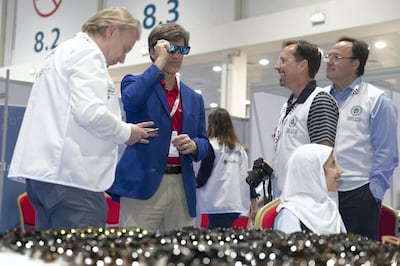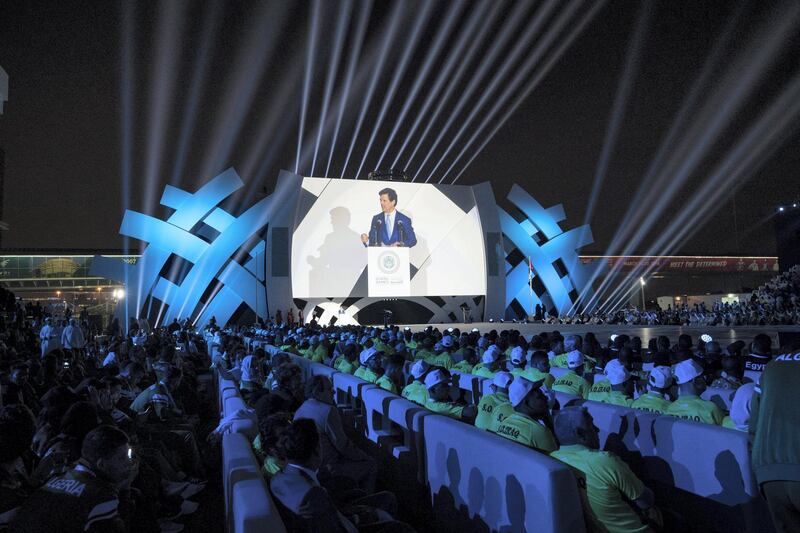In a navy blue suit with a dashing smile, he danced to the beat of the music, hand in hand with the Algerian Special Olympics team who were leading him across the stage.
“Tim Shriver!” screamed the audience at the opening ceremony of the Mena Games at Abu Dhabi's ADNEC on Thursday. Rarely is a figure so inspiring or determined to change perceptions as this fan, and also chairman, of the Special Olympic Games.
Born to Sarg Shriver, a former US ambassador to France and a candidate for vice-president for the Democrats in 1972, Timothy – or Tim – Shriver comes from one of the most well-known families in American history – the Kennedys. His family tree includes senators, public servants and a president.
Mr Shriver has a glint in his eye when he speaks of his life’s work – not politics, but fighting for the rights of people who are discriminated against, fighting for their inclusion and their acceptance. He chose to teach, to educate and to embrace others regardless of colour, religion, ethnicity and key to his career, their intellectual ability.
“I fell in love with the movement at an early age,” he says of the Special Olympics.

“I was a teacher, I am interested in the social and emotional development [of children]. I see this movement as a great teacher – it is a teacher to people with intellectual disabilities. It teaches pride and it teaches confidence. It teaches resilience. But, also, it is a great teacher to children who don’t have intellectual disabilities because, for them, it is also a teacher of ... tolerance. This, for me personally, has been my life’s work.”
Mr Shriver says, however, the world still has a long way to go.
“In the US we are reaching there, but there is still a lot of discrimination of people in healthcare, there is still a lot of discrimination in education and there is still a lot of discrimination in unemployment.” Unemployment is particularly high in people with intellectual disabilities, he said.
“This is a human rights movement in its early stages. Even though it is 50 years since the start of the Special Olympics movement, we are still in our early stages. I wish we were further along, but we still have a lot of work to do.”
As his eyes cloud over while speaking about how people of determination continue to be discriminated against, Mr Shriver also says that he does believe that some progress has been made, however small.
“We are beginning to see the shift. We are trying to shift not just the law, but hearts and minds, and this takes time. It takes persistence and many, many reminders for all of us to recognize people of determination, to recognize their gifts, their capacities, their resilience and their dignity.”
This is where the importance of events such as the MENA Games and the Special Olympics lie. People need to be reminded of how important inclusion is in every aspect of life, be it hospitals, playgrounds or places of work. In fact, Mr Shriver thinks people with intellectual disabilities make excellent employees.
“They are reliable, they are very honest, they are very loyal and they are very competent in their appropriate roles, and their roles can vary depending on a person’s skills. They can work in media, office support, human resources, customer services, all kind of departments.”
To be part of this movement, the UAE is hosting the Special Olympics World Games next year. It will see 7,000 athletes and 3,000 coaches representing more than 170 countries.
We appreciate the efforts of @TimShriver in empowering people of determination by supporting their endeavour for excellence through the joy of sports. We are all partners in this humanitarian work pic.twitter.com/gnF21bwKpb
— محمد بن زايد (@MohamedBinZayed) March 19, 2018
“The UAE isn’t there yet, but no country is there yet ... This country is saying, we want the challenge, we want to do better. That desire to improve is the most important thing, the desire to want to do better,” Mr Shriver said.
________________
Read more:
Abu Dhabi welcomes Special Olympics athletes to 'the willpower nation'
The Special Olympics are testament to the UAE's inclusivity for people like me
UAE sprinters challenge perception that Arabs don’t play sport
________________
The host programme is the largest cultural exchange program ever conducted in the Middle East and will see each of the national delegations paired with towns throughout all seven Emirates for four days prior to the Games. Through a series of sports, cultural, artistic and community events, the programme will provide athletes with the chance to experience Emirati culture.
“Any mother who has a child with intellectual disabilities in 2020, or 2021, or 2022, should feel that this (the UAE) is a country where their child is welcome and they should be proud. That is our vision.
"Special Olympics is a culture change – our job isn’t to go places where the job is done, our job is to go places where people want to embark on the journey. This [hosting programme] is not an award for the worthy, this is an invitation for anybody who wants to change. It is ... not a gold medal for achievement, it is a gold medal for effort,” Mr Shriver said.
What he would like to see in the UAE is more inclusion in healthcare and education.
“In the UAE, inclusive education is a challenge and healthcare. I would like to see inclusive early childhood and inclusive schools and healthcare, these are the things that we can make a difference on,” he said.






